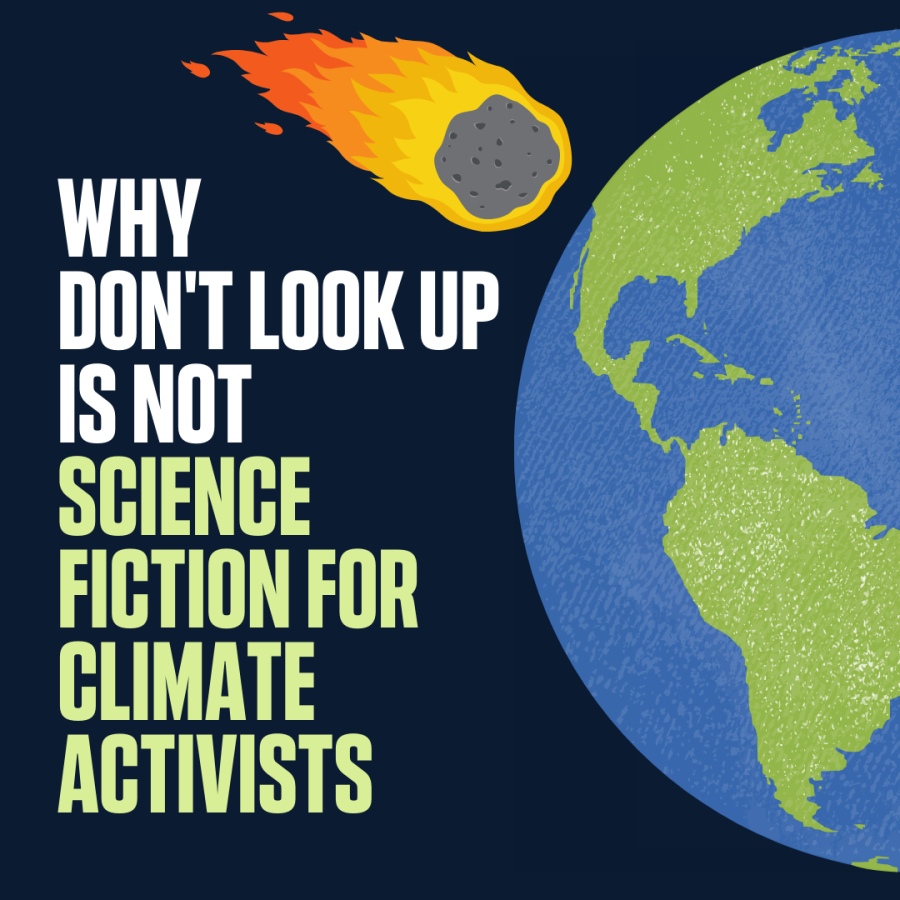Why “Don’t Look Up” Is Not Science Fiction For Climate Activists
January 24, 2022
On Dec. 6, 2021, at 2 a.m., while aimlessly browsing through Netflix’s endless selection of media, I landed on the Netflix Original film “Don’t Look Up,” a satire with an underlying message that would deeply resonate with me and keep me awake and frustrated until 5 a.m. The film, directed by Adam McKay, follows astronomers Kate Dibiasky (Jennifer Lawrence) and Dr. Randall Mindy (Leonardo DiCaprio) as they tackle convincing the public to respond to the discovery of a “planet-killer” meteor on track to collide with Earth. The film parallels the lack of mobilization taken against the climate crisis and perfectly encapsulates the frustration of climate activists and the scientific community.
I became a climate activist not by choice but instead out of a sense of responsibility and duty. I grew up in Miami, Florida — a place renowned for its beautiful beaches and wetlands — but for me, Miami always seemed like a temporary home, one filled with concrete buildings and greedy tourists. The beauty I saw in Miami lay in one place: Matheson Hammock Park.
There, I would find a home in the saltwater air and intertwined mangrove roots. Over the years, I noticed that the park began flooding higher and higher, reaching my knees (I would later learn was called “sunny-day flooding”). I decided to take AP Environmental Science in my sophomore year of high school and learned that my home was drowning before my eyes.
That class simultaneously showed me the beauty of Miami and its vulnerability; the moment I felt completely at home in Miami also became the most frightening as I realized the future I was losing. I needed to act; I needed to raise my voice for my community, for the ecosystems I love and for the future I want to have.
Just like Dibiasky, I have tried to spread knowledge of the science that illuminates the crisis we face. At times, disbelief at people’s responses to statistics and science overtook me. Elected officials would shove me aside and say, “Thank you for your passion” without taking action. Watching this movie, I saw myself in Dibiasky’s reaction to elected officials’ dismissal of indisputable facts.
“Don’t Look Up” is not science fiction — it is a reflection of the government’s lack of action and society’s dismissal of grave issues. According to a report released in October 2020 by the National Center for Science Education and the Texas Freedom Network Education Fund, Florida received a D on an A through F scale that ranked education about the climate crisis. Not only is climate change not viewed as important enough to educate future generations about, but Floridians are truly not worried about the issue itself. According to 2020 data from Yale Climate Connections, 37% of Floridians were not concerned about climate change and 46% of Floridians did not believe climate change would impact them personally.
However, there is one aspect of the climate movement that the film purposely did not depict and where the solution truly lies: the beauty and hope within the climate community. The film did not have a happy ending and it is not supposed to; it is a warning of what will naturally occur if society as a whole decides to ignore critical issues. The climate action that I have witnessed has only been a result of the mass mobilization of climate activists reaching out to their elected officials and demanding action. After much crying and worrying about the state of our nation, I found the film’s true message to highlight the need for every individual to raise their voice.
A society that stays silent is a society that is doomed, so if we take away any lessons from “Don’t Look Up,” I hope it is one of hope. I hope people do not submit to doom and fear; I hope that instead, they find empowerment in our individual ability to inspire action.











